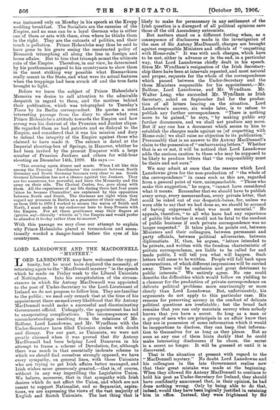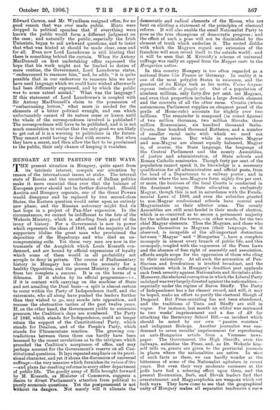LORD LANSDOWNE AND THE MACDONNELL "MYSTERY."
TORD LANSDOWNE may have welcomed the oppor- tunity, but he must have deplored the necessity, of returning again to the "MacDonnell mystery "in the speech which he made on Friday week to the Liberal Unionists of Nottingham. Into his recapitulation of the circum- stances in which Sir Antony MacDonnell was appointed to the post of Under-Secretary to the Lord-Lieutenant of Ireland we do not propose to follow him. They are familiar to the public ; we need only remark that at the time of his appointment there seemed every likelihood that Sir Antony MacDonnell would make a successful and discriminating Government official. Unhappily, the appointment has led to exasperating complications. The inconsequences and misunderstandings resulting from the relations of Mr. Balfour, Lord Lansdowne, and Mr. Wyndham with the Under-Secretary have filled Unionist circles with doubt and dismay. For our part, as Unionists, we were not greatly alarmed when it was proved that Sir Antony MacDonnell had been helping Lord Dunraven in his attempt to frame a scheme of Devolution, for, although there was much in that essentially inchoate scheme to which we should find ourselves strongly opposed, we have every sympathy, on general lines, with those Unionists who are trying to get Irish affairs better managed, and Irish wishes more generously granted,—that is, of course, without in any way imperilling the Legislative Union. We believe, moreover, that in that sympathy with Irish desires which do not affect the Union, and which are not meant to support Nationalist, and so Separatist, aspira- tions, we are expressing the views of the vast majority of English and Scotch Unionists. The last thing that is likely to make for permanency in any settlement of the Irish question is a disregard of all political opinions save those o'f the old Ascendency extremists. But matters stand on a different footing when, as a consequence of disclosures made in the investigation of the case of Sir Antony MacDonnell, charges are brought against responsible Ministers and officials of "coquetting with Home-rule." It was with such charges, which have to be met, either in advance or in the end, in a particular way, that Lord Lansdowne chiefly dealt in his speech. Since Mr. Wyndham's resignation of the Irish Secretary- ship there have been at intervals repeated, and most natural and proper, requests for the whole of the correspondence which passed between the Under-Secretary and the three Ministers responsible for his appointment,—Mr. Balfour, Lord Lansdowne, and Mr. Wyndham. Mr. Walter Long, who succeeded Mr. Wyndham as Irish Secretary, asked on September 2nd for the produc- tion of all letters bearing on the situation. Lord Lansdowne's answer, six weeks later, is to refuse to publish any further correspondence. "There is nothing more to be gained," he says, "by making public any further documents, and we shall not produce any more. But if any one has a document which seems to him to establish the charges made against us [of coquetting with Home-rule] we shall raise no objection to its publication." Presumably that is an answer to Sir Antony MacDonnell's claim to the possession of "embarrassing letters." Whether that is so or not, it will be noticed that Lord Lansdowne adds the curious caution to those who may be supposed to be likely to produce letters that "the responsibility must be theirs and not ours."
We may admit at once that the reasons which Lord Lansdowne gives for the non-production of "the whole of the correspondence" in cases such as this are, regarded from a general point of view, unimpeachable. "Those who make this suggestion," he urges, "cannot have considered what it means. Remember that we should have to publish every scrap, every memorandum, every private letter, that could be raked out of our despatch-boxes, for, unless we were able to say that we had done so, we should be accused of having suppressed what was most material." He appeals, therefore, "to all who have had any experience of public life whether it would not be fatal to the conduct of public business if such private correspondence was no longer respected." It takes place, he points out, between Ministers and their colleagues, between permanent and party officials, between political adversaries, between diplomatists. If, then, he argues, "letters intended to be private, and written with the freedom characteristic of private correspondence, are liable to be called for and made public, I will tell you what will happen. Such letters will cease to be written. People will fall back upon conversations, of which different impressions will be carried away. There will be confusion and great detriment to public interests." We entirely agree. No one could describe the difficulties which would follow on yielding to a clamour for the production of private correspondence on delicate political problems more convincingly or more clearly than Lord Lansdowne. But, unfortunately, his arguments do not apply to this particular case. His reasons for preserving secrecy in the conduct of delicate political questions are irrefutable ; but the broad fact remains that you can only maintain secrecy when nobody knows that you have a secret. So long as a man or a group of men who are principals in an affair know that they are in possession of some information which it would be inopportune to disclose, they can keep that informa- tion to themselves for as long as they please. But as soon as any one of them hints darkly that he could make interesting disclosures if he chose, the secret is a secret no longer. It will be guessed at until it is discovered.
That is the situation at present with regard to the "MacDonnell mystery." No doubt Lord Lansdowne and his colleagues in the late Government realise now that their great mistake was made at the beginning. When they allowed Sir Antony MacDonnell to continue to hold his post as -Under-Secretary for Ireland, they should have confidently announced that, in their opinion, he had done nothing wrong. Only by being able to do that, indeed, would they have been logically justified in retaining him in office. Instead, they were frightened by Sir Edward Carson, and Mr. Wyndham resigned office, for no good reason that was ever made public. Hints were dropped in political speeches that if everything were known the public would form a different judgment on the case ; and naturally the public, especially the Irish Unionists, began to ask awkward questions, and to insist that what was hinted at should be made clear, once and for all. Even now Lord Lansdowne is still hinting that there is something behind the curtain. When Sir Antony MacDonnell on first undertaking office expressed the hope that his work might not be limited to duties of mere routine, the Government, Lord Lansdowne states, "endeavoured to reassure him," and, he adds, "it is quite possible that in our endeavour to reassure him we may have used language which we could have wished afterwards had been differently expressed, and by which the public WAS to some extent misled." What was the language ? If this statement of Lord Lansdowne's is coupled with Sir Antony MacDonnell's claim to the possession of "embarrassing letters," what more is needed for the elements of a bitter political wrangle, and one which unfortunately cannot of its nature cease or lessen until the whole of the correspondence involved is published? The correspondence will have to be published, and it is not much consolation to realise that the only good we are likely to get out of it is a warning to politicians in the future. They cannot avoid having to deal with secrets. But when they have a secret, and then allow the fact to be proclaimed to the public, their only chance of keeping it vanishes.















































 Previous page
Previous page